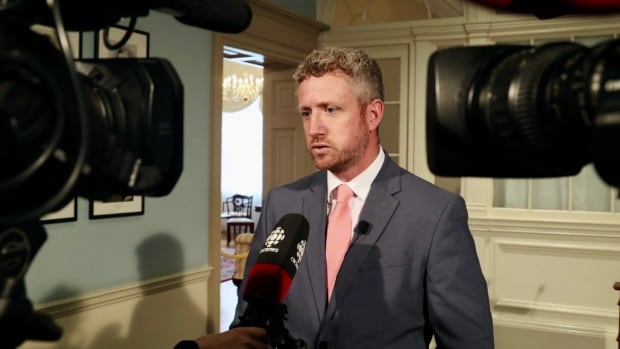Top Stories
Nova Scotia Proposes Landmark Bill to Ban Social Media for Under-16s

The provincial government of Nova Scotia plans to introduce legislation that would restrict social media access for children under the age of 16. The proposed bill, announced by Iain Rankin, the Liberal House leader, aims to make Nova Scotia the first province in Canada to establish minimum age requirements for social media use. Rankin stated that this initiative could serve as a model for other provinces considering similar measures.
During a press conference at Province House, Rankin emphasized the potential dangers posed by social media algorithms, which he believes expose young users to harmful content that can adversely affect their mental and physical health. He remarked, “It became very clear to me, as parents and legislators, that we cannot ignore the impacts of social media on youth mental health.”
If the legislation is passed, social media platforms would be held accountable for enforcing these age restrictions. Non-compliance could result in hefty fines of up to $250,000 per day. Currently, most social media platforms in Canada require users to be at least 13 years old, but this guideline is not consistently enforced. Earlier this year, a government committee in Quebec recommended limiting social media access for children under 14, but no official legislation exists at the national level.
Mental Health Concerns Drive Legislative Action
Research has increasingly shown that social media can have detrimental effects on the developing brains of young people. A study conducted by the Center for Countering Digital Hate found that harmful content related to issues like eating disorders and self-harm can surface as frequently as every 39 seconds, even when children are not actively seeking it out. Last year, the Nova Scotia government implemented a cellphone policy requiring students to turn off and store their devices during instructional time, with limited exceptions. Rankin noted that the proposed bill represents the next logical step in protecting youth.
“This is about giving their childhood back to them,” he said. Jenna Poste, a technology executive and advocate with Unplugged Canada, collaborated with the Liberals in developing the proposed legislation. She expressed that waiting until age 16 to introduce social media would help ease young people into the digital landscape. Poste stated, “That’s when they’re starting to drive. That’s when they’re starting to become an adult. We have to start teaching them how to be on these platforms safer.”
She further highlighted that many young individuals feel pressured to join social media despite not wanting to participate. Poste advocated that the new legislation could help mitigate peer pressure by establishing a common standard for social media access.
Enforcement Challenges and International Precedents
Rankin mentioned that enforcing such regulations could be more manageable at a national level. The party is exploring international best practices as they develop the legislation. Other countries have begun implementing similar age restrictions, although enforcement remains a significant challenge. For instance, Australia recently passed a law that will take effect on December 10, which imposes fines of up to 50 million Australian dollars (approximately $33 million USD) for platforms that fail to take adequate steps to prevent underage users from accessing their services.
Norway is also considering age restrictions for social media, emphasizing the complexities of establishing effective enforcement mechanisms. The Norwegian government noted that “developing effective enforcement mechanisms for an absolute age limit is both a legal and technological frontier.”
Poste asserted that social media companies possess the technology necessary to better regulate age restrictions but often refrain from doing so due to profit considerations. She believes that if enough regions, including Nova Scotia, exert pressure on these companies, they may be compelled to comply.
As this proposed legislation gains traction in Nova Scotia, it could significantly influence the conversation around children’s safety online and potentially lead to broader regulatory changes across Canada and beyond.
-

 Science3 months ago
Science3 months agoToyoake City Proposes Daily Two-Hour Smartphone Use Limit
-

 Top Stories3 months ago
Top Stories3 months agoPedestrian Fatally Injured in Esquimalt Collision on August 14
-

 Health3 months ago
Health3 months agoB.C. Review Reveals Urgent Need for Rare-Disease Drug Reforms
-

 Technology3 months ago
Technology3 months agoDark Adventure Game “Bye Sweet Carole” Set for October Release
-

 World3 months ago
World3 months agoJimmy Lai’s Defense Challenges Charges Under National Security Law
-

 Lifestyle3 months ago
Lifestyle3 months agoVictoria’s Pop-Up Shop Shines Light on B.C.’s Wolf Cull
-

 Technology3 months ago
Technology3 months agoKonami Revives Iconic Metal Gear Solid Delta Ahead of Release
-

 Technology3 months ago
Technology3 months agoApple Expands Self-Service Repair Program to Canada
-

 Technology3 months ago
Technology3 months agoSnapmaker U1 Color 3D Printer Redefines Speed and Sustainability
-

 Technology3 months ago
Technology3 months agoAION Folding Knife: Redefining EDC Design with Premium Materials
-

 Business3 months ago
Business3 months agoGordon Murray Automotive Unveils S1 LM and Le Mans GTR at Monterey
-

 Technology3 months ago
Technology3 months agoSolve Today’s Wordle Challenge: Hints and Answer for August 19









